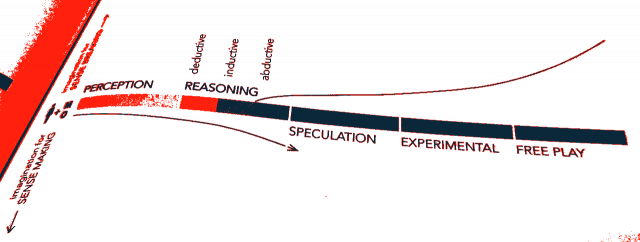
Part 1: The imagination plays a role in a wide spectrum of cognitive processes, from perception to reasoning.
The spectrum
- Perception
- Reasoning
- Deductive – conclusion follows directly from given premises
- Inductive – some missing pieces for the conclusion
- Abductive – not enough facts available for a clear conclusion. Define “best guess” hypotheses that can be tested. See: Sherlock Holmes
- Speculation
- Experimentation
- Free play
“At the far edge of abductive reasoning, as personfified by Holmes, we begin to sense a shift in our spectrum. Imaginations becomes an agent of more than perception and reasoning. It becomes fundamental to wellbeing and generative activities that aid the development of the individual in society and culture as well as the development of society and culture themselves.”
Speculation
Pragmatist philosophy, originating in the 1870’s in the US, was a “movement that sought to clarify meaning in terms of action”. Action and meaning as a continuous exchange. They understood the actual in light of the possible. Everything is understood as 1, what is in the here and now, and 2, the possibilities the imagination lets us see in it (speculation): “By generating a whole host of potential versions of what is present and actual today, it drives inquiry, which drives action, which in turn druves knowledge building that leads back to action”.
John Dewey’s concept of a ‘Moral Imagination’ extends “what could be” to “what should be”. Using empathy and creatively imagining possibilities to think through the consequences of a particular scenario as a way to find the ethical option(s).
“The purpose of speculation is to unsettle the present rather than to predict the future.”
Speculation is not fantasizing, the imagination is still grounded in present reality, then extended into possibilities. Speculative imagination is generative and can be used for:
- Emphatic projection
- Creatively exploring possibilities
- Presenting possibilities as viable by giving them texture
The experimental imagination
Beyond speculation we arrive in the experimental domain: “trying things out in an emerging context”.
The experimental imagination is about “forming images in action”. Doing something driven by curiosity, looking for novelty. Supported by the individuals personal context, knowledge and skills, but these are held in the background so that the experiment itself can lead the way in a continous back and forth between imagining and doing. A.k.a. improvisation.
“A great irony of the improvisers lot is that there is an enourmous technical requirement to meet… yet there is also a need to transcend if not negate it in order to find something truly novel.” – Keith Jarrett
The difference with the speculative imagination is that the experimental imagination turns of self-monitoring, self-censoring.
“The experimental imagination builds momentum by turning off critical faculties so that improisational making/action can take over."
Free play imagination
The experimental imagination still starts from a question and/or an individuals creative context and skills. It’s focussed play. Instead, the free play imagination is after
- Bondary crossing (or breaking) instead of boundary pushing
- Disrupting versus experimenting
- Breaking with one’s creative history
- Surprise and awe
In the zone between abductive reasoning and speculation, the role of the imagination shifts from creating understanding through synthesis to generative creation of new possible understandings.